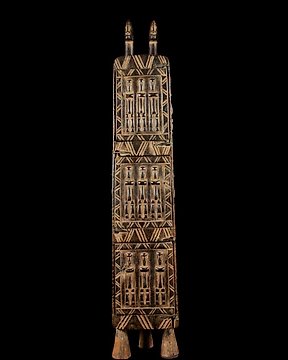
Medicijndoos - Dogon - Mali
Nr. 83439457

Nr. 83439457

A fragmentary Bamana female figure, Do Nyeleni, Mali, standing on block shaped feet, sturdy short legs slightly bent, a columnar, elongated torso, conical breasts, square, rounded shoulders, long thin arms carved close to the torso, hands near the abdomen, an elongated cylindric neck, supporting a helmet-like head composed of a thin straight mouth, long straight nose, two small indentations suggest the eyes close to the slender nose and beneath the forehead, on top a crescent shaped, striated hairddress, large, semicircular ears, pierced through by attachment holes, remnants of colorful earrings made of fabric; dark brown patina, age-cracks, insect damage, provenance Belo Mohamed Garba, Korhogo/Ougadougou.
“Small-scale female figures of this kind are known as nyeleni among the Bamana people of Mali. The figures are an idealization of youthful feminine beauty. The term nyeleni is derived from a traditional Bamana girl's name and has multiple interpretations, including "pretty little one" or "little ornament." Nyeleni figures emphasize a number of distinctive characteristics—most notably, a rather geometrically derived form. They have prominent conical breasts that project sharply from a flattened chest and are counterbalanced by exaggerated buttocks that jut out behind the figure. The arms, legs, and torsos are highly cylindrical. Hairstyles vary but usually exhibit some variation on a crestlike arrangement. The aesthetic beauty of such works is heightened by the addition of beads or metal accessories and oil, which is rubbed into the figure to produce a lustrous surface. These additions are comparable to the manner in which young Bamana women prepare themselves for special occasions.
Young unmarried Bamana men use nyeleni sculpture to represent the ideal marriageable woman they hope to find as a wife and partner. Historically, initiation societies were at the core of Bamana religious, political, and social life. In those southern Bamana communities in which the Jo society was active, all young Bamana men were required to become members. The preparation for the initiation ceremonies, which took place every seven years, required many years of study and work. The training culminated in jofaga, "killing [in] Jo," in which the candidates are symbolically reborn as a member invested with a new adult status. The new initiate then spent the next few months traveling to neighboring communities, spending two to three nights in a village while dancing and singing to display his knowledge of Jo (the author means Do. It is a listening error that runs through large parts of Bamana literature) and to earn gifts of money, cotton, or food. The initiate used these figures to enhance such performances and allude to his eligibility as an adult male seeking a spouse.
Social changes in the twentieth century have greatly impacted the role of initiation societies in Bamana culture. With transformations such as the introduction of Islam, colonialism, and urbanization, initiation societies have become a less essential element in Bamana life. As a result, fewer and fewer villages maintain ritual objects and sacred places associated with initiation societies such as Jo.”
Source: The MET Museum
Zo koop je op Catawiki
1. Ontdek iets bijzonders
2. Plaats het hoogste bod
3. Veilig betalen